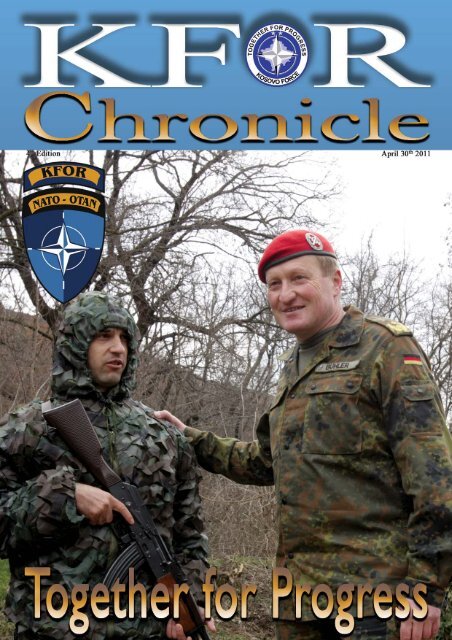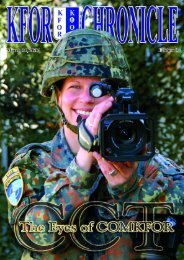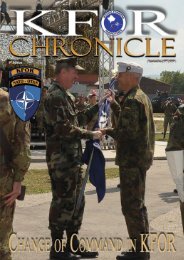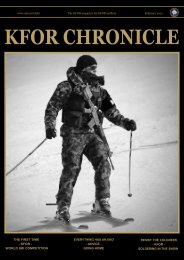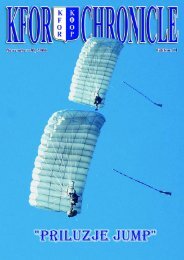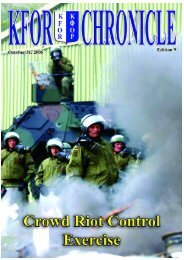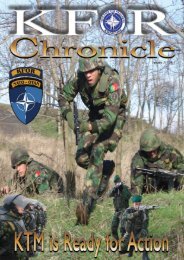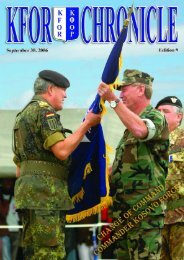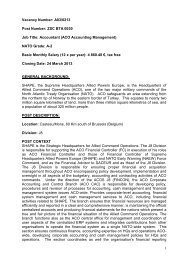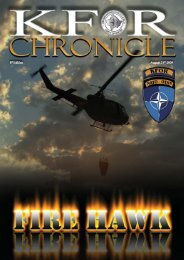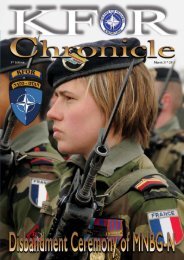Cron April 2011_Layout 1 - ACO - NATO
Cron April 2011_Layout 1 - ACO - NATO
Cron April 2011_Layout 1 - ACO - NATO
Create successful ePaper yourself
Turn your PDF publications into a flip-book with our unique Google optimized e-Paper software.
My dear comrades!I would like to congratulate you all on a job well donethroughout the first quarter of <strong>2011</strong>. KFOR had a full plateof tasks to be accomplished, and you did so with yourcustomary professionalism and competence. I thank you allfor your respective efforts in performing our mission.This past quarter has brought many structural changes toKFOR. With the progress made in the overall security inKosovo by the establishment, training, and operational useof the Kosovo Police (KP) and Kosovo Security Forces(KSF), KFOR's force structure was able to be reduced fromits 10,000 personnel battle groupcentric organization to a liaison and monitoring centricorganization of approximately 5,000 personnel. Wereduced from five battle groups down to two, and reorganized their Liaison and Monitoring Team (LMT)elements into five separate Joint Regional Detachments (JRDs). This new structure simultaneously allowsKFOR to step back from a first responder role and let the Institutions in Kosovo (IiK) assume thisresponsibility, while also retaining the capability and flexibility to respond to any potential crisis as required.As you know, one of our KFOR lines of operation is "to assist to strengthen KSF capabilities." It is mainly thetask of HQ KFOR's Military Civil Advisory Division to monitor and advise this civil protection force. The resultsare really encouraging. Today, the KSF is one of the most attractive organisations of the IiK. In the recruitmentcampaign that ended last month, more than 4,000 young people from all ethnicities and genders volunteered forthe 400 open positions in the KSF. After reaching their Initial Operational Capability (IOC) in 2009, all KSFefforts now converge towards reaching their Full Operational Capability (FOC) as soon as possible. Through ajoint KFOR/KSF assessment cycle, FOC criteria are developed and performanceevaluated, to ensure that progress is being made. But criteria are not all. KFOR and KSF will deepen theircooperation by getting to know each other better both at the HQ and unit levels. We will whenever possibleinvite KSF representatives to participate in our training, sports, and social activities. Planning for exercisesAGILE LION 4 and 5 is underway, to include KSF involvement.Another milestone achieved this past quarter was the handover of part of the former Yugoslav Republic ofMacedonia* (FYROM) border mission to the Kosovo Police Boundary and Border Police (KP BBP). As youknow, KFOR units have conducted joint patrols of all the borders and boundaries of Kosovo for the past decade.As these borders and boundaries become more stable, and the IiK become more capable of providing their ownsecurity, KFOR is able to handover such border and boundary security missions to the IiK. Such a transfer ofresponsibility is indicative of the progress being made here in Kosovo. One border section with FYROM andanother with Montenegro are all that remain to be transferred to the KP BBP, and the outlook is good that thiswill occur before the end of the year.2 KFOR Chronicle, <strong>April</strong> <strong>2011</strong>
We have seen a lot of events on Kosovo’s political scene in thefirst quarter of <strong>2011</strong>. Let me mention just the most importantones. After the repetition of elections in several municipalities inJanuary <strong>2011</strong> and the certification of theelection results in the beginning of February, the Governmentwas established on 22 February <strong>2011</strong>. The new Governmentfaced a lot of challenges since the very beginning of its work. Ithad to pass the <strong>2011</strong> Budget in the Assembly in order toovercome the budgetary provisory of the first three months, whilealso fulfilling the pre-election promises to raise the salaries ofemployees in the public sector – a decision which meant a heavyburden to the Kosovo budget. It also had to start EU mediatednegotiations with Serbia in Belgrade, facing strong oppositionboth in the Assembly and by the public. Last but not least, it hadto face the decision of the Constitutional Court declaring theelection of the President on 22 February <strong>2011</strong> unconstitutional. Iam glad I can say that the Government and the leaders of thepolitical parties managed to overcome all those problems.Kosovo now has a young and dedicated President, a Governmentapproved by the majority in the Assembly, a budget which allowsthe functioning of Institutions in Kosovo, and the dialogue withSerbia on the technical issues continues in a constructive way.My fellow comrades! Your service here in Kosovo remains as relevant as ever. We are getting closer toattaining our mission goals, but still have a considerable way to go. As the day to day mission here has becomeless and less of a kinetic nature it has become easier to become complacent in our tasks. I challenge you not tobecome so. Only by remaining steadfast in our commitments, both as individual soldiers and as an organization,will we persevere in our goal of keeping Kosovo safe and secure. To this end may we all continue to be"Together for Progress!"* Turkey recognises the Republic of Macedonia with its constitutional name.Commander KFORMajor General Erhard Bühler, German ArmyChief Public Affairs Officeand KFOR SpokesmanCaptain Dr. Hans-Dieter Wichter, German NavyChief Internal Information & EditorCommandant Daragh O’Brien, Irish Defence Forceso’briend@hq.kfor.nato.intPhotographer and DesignMr. Afrim HajrullahuCover PhotoMaster Sergeant Steffen Maluche, German ArmyE-mail & web:kforchr onicle@hq.kfor.nato.intwww.nato.int/kforThe KFOR Chronicle is produced and fullyfunded by HQ KFOR. It is published for KFORforces in the area of responsibility.The contents are not necessarily the officialviews of, or endorsed by, the coalitiongovernments’ defense departments.Editorial content is edited, prepared andprovided by the Internal Information Sectionof HQ KFOR’s Public Affairs Office(PAO) in Pristina, Kosovo.PAO HQ KFORreserves the right to edit content toconform to style and space requirements.Articles run on a space-available basis.The KFOR Chronicle isprinted by RASTERTel: 038 601 606Nations within KFOR:<strong>NATO</strong> NationsAlbaniaLuxembourgBulgariaNetherlandsCanadaNorwayCroatiaPolandCzech RepublicPortugalDenmarkRomaniaEstoniaSloveniaFranceSpainGermanyTurkeyGreeceUnited KingdomHungaryUnited StatesItalyNon-<strong>NATO</strong> NationsArmeniaMoroccoAustriaSwedenFinlandSwitzerlandIrelandUkraineKFOR Chronicle, <strong>April</strong> <strong>2011</strong>3
Photos by Staff Sergeant Stefanie Hoffmann, German ArmyMajor General Rahman Rama, Land Force Commander,Kosovo Security Force (KSF) and Chief Military CivilAdvisory Division (MCAD), Brigadier General EnricoSpagnoli, attend the first KSF NCOs conferenceon 29 March <strong>2011</strong> at Pristina Barracks.Kosovo Force Commander (COM KFOR), MajorGeneral Erhard Bühler, welcomes Lieutenant GeneralHubertus von Butler, Chief of the German ArmyCommand, to HQ KFOR, Camp Film City, on 29 March<strong>2011</strong>.COM KFOR meets members of the Luxembourgcontingent during his visit to Novo Selo on 01 <strong>April</strong> <strong>2011</strong>.Staff Sergeant (OR-6) Anica Kuyumdjan, Public AffairsOffice (PAO) HQ KFOR, receives her <strong>NATO</strong> KFORservice medal from KFOR Chief of Staff, BrigadierGeneral Wilton S. Gorske, during the Medal Parade heldin Camp Film City on 07 <strong>April</strong> <strong>2011</strong>.4KFOR Chronicle, <strong>April</strong> <strong>2011</strong>
Mr Agim Çeku, Minister for the Kosovo Security Force,and Deputy Kosovo Force Commander (DCOM KFOR)Brigadier General Marco Serronha conduct a presspoint at the launch of a humanitarian project betweenKSF, KFOR and the Municipal Assembly ofFerizaj/Urosevac on 08 <strong>April</strong> <strong>2011</strong>.COM KFOR welcomes Commander Allied Joint ForceCommand Naples, Admiral Samuel J. Locklear III, on theoccasion of his visit to HQ KFOR on 15 <strong>April</strong> <strong>2011</strong>.On 18 <strong>April</strong> <strong>2011</strong> COM KFOR chaired the Commandersconference hosted by Commander Multi National BattleGroup West, Colonel Carlo Emiliani, at Camp VillagioItalia in Peje/Pec.On 19 <strong>April</strong> <strong>2011</strong> COM KFOR paid an office call tonewly elected President of Kosovo, Her ExcellencyPresident Atifete Jahjaga, at Government Buildings,Pristina.KFOR Chronicle, <strong>April</strong> <strong>2011</strong>5
Story by Commandant Eugene Doyle, Irish DefenceForcesPhotos by Mr Afrim HajrullahuThe Kosovo Security Force (KSF) held its firstNon-Commissioned Officers (NCO) conference onTuesday 29 March <strong>2011</strong> at the Land Forces Command(LFC) in Pristina Barracks. This represented anothermajor milestone in the progress of the KSF. BrigadierGeneral Enrico Spagnoli, Chief Military CivilAdvisory Division (MCAD) in KFOR and MajorGeneral Rahman Rama, Land Forces Commander,KSF, attended the conference. Also in attendance weremembers of MCAD staff and a number of SergeantMajors, from both KFOR and KSF. Brigadier GeneralSpagnoli, in his opening address, stressed that theNCO Corps is the backbone of every militaryorganisation and it is vital that senior NCOs take theinitiative.“You exercise the power of your choices: to do theright thing and to make it prevail at whatever cost; toalways speak the complete truth; to assumeresponsibility; to be accountable for mistakes as wellas rewarded for accomplishments; and to make thesechoices without calculation of risk or reward,” he said.Major General Rama stated that KSF appreciate thehelp of KFOR officers and NCOs. “The developmentof NCOs cannot be achieved overnight. This is a firststep. I’d like to thank KFOR for the initiatives andcourses it has conducted,” said Major General Rama.Following the opening speeches, the agenda andpurpose of the conference was outlined by CommandSergeant Major Fetah Zejnullahu, LFC, KSF, whothereafter chaired the conference.Items on the agenda included the KSF NCO concept,6 KFOR Chronicle, <strong>April</strong> <strong>2011</strong>
the NCO situation in LFC, the requirements for NCOdevelopment, NCO education and the next steps indevelopment. The KSF NCO concept, which had beenapproved in July 2010, was described as a goodtactical concept which provides details of the work ofNCOs and how to support officers in accomplishingthe mission.The NCO situation in LFC was outlined by theSergeant Majors of LFC, Rapid Reaction Brigade,Operational Support Brigade and Training andDoctrine component. A detailed discussion ensued onsenior NCO appointments in the KSF organisationchart, both filled and unfilled; and the necessity fordetailed, up to date legal regulations was identified.NCO training and education were also discussed. Acomplicating factor is the current strength of KSF. Forexample, the Rapid Reaction Brigade is presently at50% strength, so it was recommended that this shouldbe taken into account when filling senior NCOappointments.The conference resumed after lunch when a pointpaper was circulated for further discussion. A range ofsubjects such as legislation for KSF, an NCO schooland the enhancement of discipline were discussed.Lieutenant Colonel Mike Ashford, Office of DefenceCooperation, outlined three programmes that arecurrently running: International Military Educationand Training, Foreign Military Finance Programme,and State Partnership Programme. As part of the StatePartnership Programme, he described the existing linkbetween Iowa National Guard and the KSF andmentioned the possibility of an exchange in the future.Following a summary, the first KSF NCO conferencewas concluded. More conferences of this nature willfollow.KFOR Chronicle, <strong>April</strong> <strong>2011</strong> 7
Story by Staff Sergeant Anna Doo, 200th PADPhotos by Captain Giovanni Pacitto, Italian ArmyHundreds of service members, representing tencountries, participated in the official Transfer ofAuthority ceremony of Multinational Battle GroupEast (MNBG E) from Colonel Francisco J. Neuman toColonel Michael D. Schwartz at Camp Bondsteel onSaturday 02 <strong>April</strong> <strong>2011</strong>.The Transfer of Authority is rich in history and ritual,dating back to the eighteenth century during the reignof Frederick the Great of Prussia. During that time,flags were created with symbols and colors unique toeach Unit. Soldiers would dedicate their loyalty andtrust to the flag as a representation of the Unit, and tothe Unit Commander. During a Transfer of Authorityceremony, the flag would be passed to the individualtaking command showing a shift of authority. Thisaction was performed with the Unit present so allcould see who was assuming responsibility of thegroup. The allegiance of the troops belonged to theflag and the leader who held it. This tradition is still inpractice today.As part of the Transfer of Authority ceremony, thecommander performs a review of the troops’ conditionand state of readiness prior to battle. During the 02<strong>April</strong> ceremony, Kosovo Force Commander (COMKFOR), Major General Erhard Bühler, was given theopportunity to review the incoming MNBG E KFORXIV soldiers. Standing in front of him were soldiersfrom France, Germany, Greece (Hellas), Morocco,Poland, Turkey, United States of America and Ukraine.Colonel Schwartz, of Clovis, New Mexico,Commander of 111th Maneuver Enhancement8 KFOR Chronicle, <strong>April</strong> <strong>2011</strong>
Brigade, based in Rio Rancho, New Mexico, and thesoldiers under his command, officially acceptedresponsibility of MNBG E from Colonel Neuman, ofPonce, Puerto Rico, Commander of 92nd ManeuverEnhancement Brigade, San Juan, Puerto Rico, and thesoldiers in his battle group.“It is an honor to assume the KFOR mission, and Ilook forward to continuing to build on the workaccomplished by my predecessors. We have cometogether from all over the United States and have builta strong, cohesive organization,” said ColonelSchwartz. Prior to and during the ceremony, themultinational aspect of the <strong>NATO</strong> mission here wasapparent. A U.S. soldier, 2nd Lieutenant ChristopherTebo, and a French soldier, Sergeant Quillien, werediscussing their duties in their respective formations.Both Lieutenant Tebo and Sergeant Quillien leadpatrols and both are looking forward to thedeployment as a way to gain more experience.“I will learn a lot from my soldiers, from my chain ofcommand, and from other fellow soldiers who arearound,” Lieutenant Tebo said.Sergeant Quillen expressed the same sentiment ofgaining experience for his fellow sergeants, and forhimself while here in Kosovo.During the ceremony, the Greek Band played the sharpresounding notes of all the ceremonial music andmarches, and each nation stood in formationresponding to the commands of their respectiveleaders with crisp movements. The uniforms aligned infront of Major General Bühler, Colonel Schwartz andColonel Neuman were all different, yet when mixedtogether in the melting pot of the <strong>NATO</strong> mission, theycreate a force focused on providing a sense of securityfor those in Kosovo.KFOR Chronicle, <strong>April</strong> <strong>2011</strong>9
Story by Mr Ibrahim Shala, Ministry Kosovo SecurityForces (MKSF)Pictures by Mr. Naim ShalaOn 08 <strong>April</strong> <strong>2011</strong> a joint humanitarian project betweenKSF, KFOR and the Municipal Assembly ofFerizaj/Urosevac was launched. The project willoversee the construction of a mountainous road in thevillage of Burrnik-Stanet e Gremes, with a total lengthof 7.5 kilometers.Kosovo Security Force (KSF) Minister, Mr AgimÇeku; Commander of the Kosovo Security Force,Lieutenant Geneneral Sylejman Selimi; DeputyCommander KFOR (DCOM KFOR), BrigadierGeneral Marco Serronha; Chief KFORMilitary-Civilian Advisory Division (MCAD),Brigadier General Enrico Spagnoli; the Deputy Mayorof Ferizaj/Urosevac Municipality, Mr Besim Zymberiand other officials attended the inaugural ceremony.On this occasion, KSF Minister, Mr Agim Çeku, saidthat KSF specialized engineering units weredemonstrating that they are ready and capable toaccomplish more demanding tasks for the interest ofthe citizens of Kosovo. “I congratulate our units for theconstruction of this road and I believe that they willmanage to accomplish the construction work as soonas possible in order to improve the living conditions ofthe local residents of this area and to enable them tohave easier access and movement to their properties.10 KFOR Chronicle, <strong>April</strong> <strong>2011</strong>
I believe that this will not be the last activity of theKSF units, as we will be ready to act throughoutKosovo, wherever our help is needed” he said.Minister Çeku stressed that the KSF has an excellentrelationship with KFOR, the Ferizaj/UrosevacMunicipality, and the community and thanked all ofthem for their wide-ranging support in order toaccomplish this important project for the residents ofthis area. He said “I believe that we will all benefitfrom this project, but the main beneficiaries will be themunicipality and the residents of this area who will beable to invest in tourism, to plow their land and tomake use of their pastures”.The residents of this area expressed their gratitude forthis project, for the KSF and Ferizaj/UrosevacMunicipality, who are providing a direct contributionto improve the living conditions and the movement ofthe local residents to their properties and pastures.During the term of this project, 13 KSF members willreceive certificates for being able to handle the heavyengineering machines and equipment. They will becertified by KFOR instructors and by instructors fromthe Ministry of Infrastructure.The project is due to be accomplished within threemonths, as planned.KFOR Chronicle, <strong>April</strong> <strong>2011</strong>11
Story by Captain Alexandridis Dimitrios, Greek ArmyPhotos by Master Sergeant Mitsios Grigorios, GreekArmyIt’s been almost 5 months, but now the mandate of theHellenic Battalion, subordinated to Multi-NationalBattle Group East (MNBG E), is coming to an end. 5months full of activities and constant effort to embeditself into its area of responsibility (AOR) and creatinglasting bonds of trust with the local population.Forging strong bonds with the locals takes time.Continuous, varied and relevant efforts are required toprove yourself as a reliable and trustworthycounterpart. KFOR units Kosovo-wide constantly tryto make themselves relevant to the lives of localpeople; and the Hellenic Battalion is certainly noexception. The Hellenic Battalion always tries to do itsbest within its means and capabilities, and the rewardsare magnificent. It’s the smile you offer and the bighand you extend to ease people’s worries; it’s the timetaken to listen to a little child’s story and share a hug!Hellenic Battalion has contributed significantly to thelocal population’s needs during the last five months,distributing tons of food and clothing. During this tourapproximately four tons of clothing and one ton offood has been distributed in the Ferizaj/Urosevac,Babljak and Recak areas during humanitarianoperations. The source of this humanitarian aid wasmainly the Greek-Orthodox Church.Around the New Year the Hellenic Battalion made a12 KFOR Chronicle, <strong>April</strong> <strong>2011</strong>
donation of medical supplies to the Ferizaj/Urosevacpublic hospital and also conducted lectures in localprimary schools to eeducate pupils on public healthmatters. February and March saw a significant numberof medical examinations carried out at theFerizaj/Urosevac Retirement Union.Other notable activities included a donation ofmedicines to the Christian Orthodox Monastery ofNovo Selo and a donation of food and medicalproducts to orphans of Serbian origin in February. InMarch personnel from 507 Mechanised Battalionvolunteered for a blood donation at Pristina UniversityHospital; and the Hellenic Battalion is particularlyproud of a fund-raiser in support of a child inFerizaj/Urosevac who had contracted cancer, whichgenerated almost €1,000.The donations outlined above, as well as many othersorganised by this unit, were very beneficial for thepeople of the villages who were most in need. Theseefforts are certain to have long lasting effects. Strongbonds have been forged so far between the Kosovopeople and the Hellenic LMT. Local needs werelargely met and the delight on their faces was the onlyproof required. Striving to positively affect people’slives takes effort and, hopefully, the greatest benefitwill be peace itself!KFOR Chronicle, <strong>April</strong> <strong>2011</strong>13
Example, Commitment, Heart, andHumour: the Swisscoy’s core principlesStory by Specialized Officer Enrico Campioni, SwissArmy,Photos by Captain Ralph Heiniger, Swiss ArmyOn Thursday 07 <strong>April</strong> <strong>2011</strong>, the military airfield ofPrishtina International Airport “Adem Jashari” hostedthe Change of Command ceremony of the Swiss ArmyForces “Swisscoy” in Kosovo. The event was presidedover by Major General Jean-Marc Halter, Chief ofArmed Forces Joint Staff, Switzerland.After a six-month tour of duty, the Commander of23rd Contingent, Lieutenant Colonel RobertTischhauser, handed over command of Swisscoyactivities to Lieutenant Colonel in General Staff (GS)Stefan Christen. Most of the Contingent is based inCamp Casablanca, near Theranda/Suhareka. OtherSwisscoy elements are deployed to the Liaison andMonitoring Team (LMT) houses of Prizren andMalishevo in the South, and near Novo Selo in theNorth, or in Camp Bondsteel, Pristina and Prizren.The new Swiss posture in Kosovo reflects a reducedinfantry role. Future efforts will concentrate on LMTactivities and on KFOR Joint Logistic SupportGroup’s daily business around the entire country. It’s14 KFOR Chronicle, <strong>April</strong> <strong>2011</strong>
also worth noting that Swisscoy will also provide anumber of personnel to serve with the InternationalMilitary Police (IMP).Lieutenant Colonel (GS) Christen described in detailthe magnitude of these “updated” Swisscoy’s tasksduring his speech at the Change of Commandceremony. He also underlined the successful story ofSwisscoy’s engagement in Kosovo to date, and thepositive feedback from the local population, thanks inno small part to the work and development of theSwiss LMT’s.Lieutenant Colonel (GS) Stefan Christen, a 42-yearold professional officer, also highlighted that the coreprinciples of his contingent will be “Example,Commitment, Heart, and Humour”. Additionally,these four core values will be augmented by otherdistinctive Swiss Army true values, like strongdiscipline, a confirmed expertise and a forthcominghuman approach.The 24th Swisscoy Contingent will continue itsactivities across Kosovo until mid-October, <strong>2011</strong>.KFOR Chronicle, <strong>April</strong> <strong>2011</strong>15
Story and Photos by 1st Lieutenant Kyriakidis Ioannis,Greek ArmyBeyond any economic or staffing crisis, the only thingthat matters in the function of a primary care (Role 1)medical centre is its ability to handle patients andrelevant issues in an efficient manner. Taking over theRole 1 Medical Centre in Camp Rigas Fereos, we hadto deal with an overloaded budget, caused, in no smallpart, by a high number of admissions to the Role 2Hospital in Camp Bondsteel, thereby significantlyincreasing costs. The challenge was to minimize costsof medical care, while not risking, in any way, thequality of the care given.Our Role 1 Medical Centre serves over 800individuals, including all Greek soldiers in KFOR, theArmenian Platoon of KFOR, EULEX personnel in theregion and civilian personnel. Additionally, a Greekvehicle supply train has to be inspected weekly inorder to prevent the spread of infectious diseases thatare currently endemic in Greece. Notwithstandingthese primary tasks, we also engage in a significantnumber of humanitarian activities: regular medicalsupervision of the Pensioners Club and the NursingHome in the Municipality of Ferizaj/Urosevac,provision of medication for the local hospital andvisits to local schools, monasteries and organizationsto emphasize basic aspects of public hygiene.Furthermore, we have “adopted” several nativeoutpatients with rare diseases.The challenge of meeting all these varied tasks falls tothe very small staff of our Role 1 Medical Centre,comprising just 2 physicians, 1 dentist and 316 KFOR Chronicle, <strong>April</strong> <strong>2011</strong>
medics/stretcher bearers, assisted by two drivers.Under these difficult circumstances it would beunderstandable if most patients were referred to theRole 2 facility in Camp Bondsteel. However, thispractice would result in a significant increase in costsand degrade the meaning of primary care byoverloading hospitals of higher roles with “easy” totreat patients.During the last 4 months this small team of dedicatedand hardworking personnel has recorded 784 visits toour Medical Centre. 89 of these patients werehospitalized or were short–stay inpatients in ourpatient ward and only 15 patients were referred toCamp Bondsteel Hospital. Overall, our team achieveda decrease of 80.8% in the number of patients sent toour Role 2 Hospital, while costs dropped more than6–fold. All this was achieved with no reduction in thequality of care for patients.In conclusion, the key to having a successful, potentand low–budget Role 1 Medical Centre are: (1) Directand everyday interaction of the medical staff with allsoldiers; (2) Constant vigilance and input regardinghygiene issues and improving the quality of life; (3)Regular checking of public areas and food; (4)Confidence of the physician in his knowledge,continuing education and making most of the medicalequipment and personnel he has; and (5) Cooperationwith chief sanitary services.Finally, I would like to express my gratitudeto all ourcolleagues from the hospital in Camp Bondsteel fortheir excellent cooperation.KFOR Chronicle, <strong>April</strong> <strong>2011</strong>17
Story by Sergeant Minhava, Portuguese ArmyPhotos by Private Moreira, Portuguese ArmyOn 23 March <strong>2011</strong>, the KFOR Tactical ReserveManoeuvre Battalion (KTM) conducted a Transfer ofAuthority ceremony at Camp Slim Lines, wherePortuguese 2nd Mechanized Infantry Battalion(2BIMec) relieved Portuguese 1st Parachute Battalion(1BIPara). The ceremony was presided over by KosovoForce Commander (COM KFOR), Major GeneralErhard Bühler. Also present were his Excellency Mr.Lóránt Balla, Hungarian Ambassador to Kosovo; hisExcellency Mr. Christopher Dell, US Ambassador toKosovo; Major General Martins Ribeiro, DeputyCommander, Portuguese Land Forces Command(LCC); Brigadier General Marco Serronha, DCOMKFOR; members of the HQ Staff, and otherdistinguished guests, both military and civilian.The ceremony, the first to include soldiers from theHungarian contingent, commenced with thetraditional salute to COM KFOR followed by thereview of the troops on parade. This was followed by abrief message delivered by Major General MartinsRibeiro on behalf of the Portuguese Commander LCC .Thereafter, the Portuguese National Flag was handedover by the outgoing Commanding Officer, Lieutenant18 KFOR Chronicle, <strong>April</strong> <strong>2011</strong>
Colonel Paulo Abreu, to the incoming CommandingOfficer, Lieutenant Colonel Amaral Lopes, thussymbolizing the Transfer of Authority. At this time theHungarian contingent joined the ceremony and unitedwith the Portuguese forces on parade.Lieutenant Colonel Amaral Lopes started his speech bythanking COM KFOR for his presence and also for thepresence of so many honorable and distinguishedguests. He said that “KFOR Commanders TacticalReserve means a high state of readiness, and a highresponse to the several contingencies that may arise.This challenge is only within the reach of wellprepared, disciplined and motivated forces”.Addressing his soldiers he highlighted “the core valuesyou possess, which are a permanent guarantee of theprofessional way you will carry out your mission in thefollowing six months”. In his address COM KFORGeneral Bühler said farewell to the 300 soldiers of the1BIPara and at the same time he welcomed thesoldiers of the 2BIMec of the Portuguese ArmedForces: “Together with Brigadier General Serronha andall comrades of KFOR we are proud to have you hereand I am sure that your performance will beoutstanding”. COM KFOR highlighted the newmultinational environment at KTM and added that itwill remain the backbone of KFOR’s ability for rapidreaction in the future.KFOR Chronicle, <strong>April</strong> <strong>2011</strong>19
Story and Photos by Lieutenant Magali Beynel,French ArmyOn 11 March <strong>2011</strong>, the Joint Regional DetachmentNorth (JRD N) led its first Civil/Military Cooperation(CIMIC) project since its establishment inNovo-Selo.In Grace village, in the municipality ofVushtri/Vucitrn, roadwork infrastructure wasimproved with the assistance of a detachment of the3rd Engineers Battalion of Charleville-Mézière. As aresult of this operation, traffic on the route hassignificantly improved. School buses can pass withease and vehicles can now reach the health centrewithout any risk of getting bogged down.This is not the first time that French intervention hasassisted this village. Previous donations of medicines,as well as consultations by military medical officershad already benefitted the local health centreconsiderably. Nevertheless, the improvement of theroad is the first project for JRD-North, led by Francesince it was recently established in Novo Selo. Underthe command of a French colonel, this new entitycomprises approximately fifty people. It isresponsible for the northern part of Kosovo and hasthe mission to maintain contact with local authoritiesand the population in its Area of Responsibility(AOR).4 other JRDs have also been created as a result of therecent KFOR transformation and the passage to Gate2. Each of the 5 JRDs has an area of responsibility(North, South, East, West and Centre). ForJRD-North, five Liaison Monitoring Teams (LMT)comprising Swiss and Slovenian personnel maintainconstant contact with the local population.These new structures provide continuity in the mission,ensuring that the population will continue to seeKFOR personnel working on the ground, helping toimprove the living conditions in Kosovo andparticipating in the development of the country.20 KFOR Chronicle, Aprli <strong>2011</strong>
Story by Commandant Daragh O’Brien, Irish ArmyPhotos by Staff Sergeant Elisabeth Schöneberg,German ArmyThe Pristina Women and Children’s centre receives nogovernment funding; as a result it is completely relianton the support they receive from military personnelstationed at HQ KFOR in Film City. Consequently, on10 <strong>April</strong> <strong>2011</strong> a joint effort was made by the American,German, Irish and Canadian contingents to raisemoney to support the centre.Together they came up with the idea to hold a streetparty and offer food to their fellow KFOR soldiers withthe proceeds going to support the centre. TheAmerican contingent provided the cheese burgers,salad and chips. The Canadian soldiers provided thesoda at no cost to the committee. The German soldierstook care of entertaining the children, which includedface painting, dodge ball and other games. The Irishwere responsible for bringing the children on base,putting up the tent for the children to eat in, andproviding the BBQ. In return, the centre coordinated ashow for KFOR soldiers.The day was a tremendous success as over €1,000 wasraised for the centre. This money will be used topurchase food, conduct maintenance, pay theelectricity bill and take the children on trips that wouldotherwise be impossible.“Together for Progress”KFOR Chronicle, <strong>April</strong> <strong>2011</strong>21
Name: Lisandra Pacheco de AlbuquerqueTitle: CorporalNationality: PortugueseUnit Source: KTM/TACRES/KFOR (parent unit 2nd InfantryMechanized Battalion)Family reaction: My family accepted my decision to come to theKosovo theatre of operations, very well. They already knew that thiswas one of my goals when I decided to join the army. It is difficultbeing so far from home for so long but nowadays technology helpsus to overcome the distance and feel a little bit closer to home.About the mission: I have been in Kosovo only for a little over onemonth now and this is my first mission abroad. This is everything Iwas hoping for; to be able to have new experiences in a differentenvironment from the one I was used to back home. I am a clerk anda driver so I am able to go and visit a lot of different places andexperience the culture and the people. The military multinationalaspect of it is great; I find it very interesting to meet forces from allover the world. No doubt this will be a unique opportunity in my lifewhich I intend to enjoy in the best possible way!Plans for after the mission: I intend to return to my home unit in Portugal to continue with my career, maybeI will try the Officers Academy or the NCO School.Hobbies: I love playing football, practicing acrobatics, listen to music, reading, going to movies, travellingand being with people; these are the most important things in my life.Name: Milan PelkoRank: Master SergeantNationality: SlovenianHome Unit: 14th Engineer Battalion, 72nd BrigadeUnit in KFOR: Tradoc mentoring & Advisory Team / MCAMilitary Education: After enlisting in Slovenian Army I did allmandatory military courses and schools in Slovenia and also abroad(Germany, United States). I graduated from the United StatesSergeant Major Academy - Mighty Class 58.About the mission: This is my third overseas mission and secondtime in Kosovo. This mission is a little different for me, because hereI work as a mentor to the KSF NCOs. I am trying to share myexperience with them but at the same time I am learning every day aswell. I have to say that I like to work in multinational environmentbecause you get to know a lot of different nationalities and culturesand this makes your life richer.Family reaction: I have strong support from my family, they knowhow soldier’s life is and that being away is part of it. Yes they missme and I miss them a lot too, but thankfully we have Skype whichgives us the opportunity to talk and see each other often.Plans after the mission: I will soon finish this mission (end of<strong>April</strong>) and I will go home to spent quality time with my family and then try to find new challenge, because lifewithout challenges would be boring.Hobbies: I like to do sports, almost everything and I enjoy very much reading books.22 KFOR Chronicle, <strong>April</strong> <strong>2011</strong>
NAME: Ardian Nrecaj - ArdiJOB TITLE: LinguistPOSITION: Public Affairs AnalysisEXPERIENCE: Ten years working for Northrop Grumman supporting USKFORLANGUAGE: Albanian (native), Serbian and EnglishJOB IN PROGRESS: This summer will be ten years that I am withNorthrop Grumman working as a linguist in support of the US Army. It hasbeen more than four years since I was assigned to provide linguist support tothe Public Affairs Office for Multinational Battle Group East. Throughoutthis period I have had a pleasure working with several public affairsdetachments and learning about public affairs, media relations and mediaanalyzing. This kind of work has motivated me to pursue an education injournalism and mass communication. I believe that the experience I havegained working here will help me in my future career in public relations.Part of my work routine in the public affairs office, is to go through all dailynewspapers and news web sites from Kosovo and the region and analyzewhat is being said. I translate stories; I help the PAO and unit membersprepare and send the press releases to media outlets in Kosovo; I help thePAO unit to maintain a good relationship with the press in our sector. Inaddition, at the end of each week I help compile a report about the mediacoverage within Kosovo of KFOR activities.I am very proud to have had the opportunity to be a part of the KFOR mission for many years here in Kosovo. It hasbeen a great pleasure to work alongside the wonderful men and women in KFOR organizations. I am looking forwardto the day when I will be able to use my experience gained as a PAO linguist to advance my career.FAMILY REACTION: My family has been very supportive and proud of me in what I do. My brother is jealousbecause I get to hang out with all the multinationals in uniform.HOBBIES: I love lifting weights at the gym, playing football (soccer for my American friends), and skiing.After serving as Editor of the KFOR Chronicle for the last eightmonths the time has finally come for Commandant (OF3)Eugene Doyle to return home to Ireland after completing ahandover of responsibilities to Commandant Daragh O’Brien,Irish Army.Commandant Doyle’s tenure as Editor coincided with a verychallenging time for KFOR – the last eight months has broughta significant number of Changes of Command (CoC) andTransfers of Authority (ToA), not to mention the restructuringof KFOR and the consequent transformation of KFOR’s role.The KFOR Chronicle has dutifully documented all the upheavaland stories that resulted during this time. I would like to takethis opportunity to thank Eugene for his excellent contributionto KFOR throughout the last eight months, his patience andexpertise during the handover/takeover period, and wish him asafe journey home to Ireland for a well deserved rest.I would also like to take the opportunity to encourage all budding journalists out there to send articles and pictures to ushere at the Chronicle. We can only document life in KFOR if you send us your experiences to share with the broaderorganisation. Ideally, articles should be between 400 - 450 words long with 7 -8 captioned photographs accompanying thetext.I look forward to hearing from you.Daragh O’BrienOF-3 IRL AEditor, KFOR ChronicleKFOR Chronicle, <strong>April</strong> <strong>2011</strong>23


